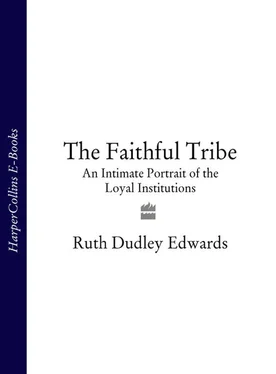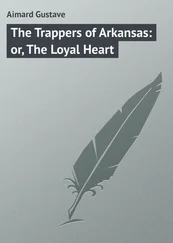The brethren of the rural Orangeman’s lodge were Calvinist or Free Presbyterians and 90 per cent would go to church every Sunday. Like most Orange lodges, his was strictly teetotal. The dues were £12 a year and the difference had to be made up by jumble sales; even raffle tickets were not allowed.
For geographical reasons, rural lodges are more likely than urban to be socially mixed. These days very few of the gentry or the better-off would attend lodge meetings, though one of the exceptions is Eldon Lodge in Belfast: ‘It’s the toffs’ lodge,’ said my urban friend, ‘for the great and the good; the one Stormont Cabinet ministers traditionally would have been members of. Today it has people like Josias Cunningham [Ulster Unionist Party president] or John Taylor [UUP deputy leader], who never goes but needs to have a sash available if required.
‘While we shelter under the trees in the rain on the Twelfth with ham sandwiches and warm Guinness, they bring a caravan and drink champagne and eat canapés. One year they had shrubs outside. They only walk to the field. Never walk back. And they all wear bowler hats with an orange lily on the side of it. I don’t know how they’d survive in an ordinary lodge.’ *
There are several business and professional lodges like that in Belfast. One was nicknamed the ‘Cripple Lodge’, because they couldn’t walk – being important chaps, most of them were speaking around the country on the Twelfth. Over the years there have been lodges for special interest groups from bakers to shipworkers to soldiers, but deindustrialization has reduced their numbers dramatically. In Belfast, many lodges would have a broadly working-class catchment area. But in most rural areas, lodges have almost always been cross-class, which is one of the reasons for keeping the dues low. James Molyneaux, ex-leader of the Ulster Unionist Party, joined his local lodge in Crumlin, County Antrim, in the late 1930s.
‘It was a watershed year for our little lodge when Colonel Pakenham, who was landed gentry and a member of the Senate, transferred from the toffs’ lodge in Belfast to ours and became Deputy Master. My father was the WM and we were bottom of the social tier as farmers. And I used to think it very odd that this great man who had been through all these battles and all that – and had been in command in Palestine – sat there deferring to the WM and ensuring that everyone else did the same. And as DM he would have gently reproved anyone who spoke out of turn without addressing the chair.
‘They decided to build a new hall and Pakenham offered to go on the organizing fundraising committee: he would bring aristocracy to events – people like Craigavon and the Marchioness of Charlemont on a couple of occasions. We were rubbing shoulders with all that. So you had the top drawer and the bottom drawer.
‘There were ten or twelve workers on the Pakenham estate. And if one was first committee man or something, the colonel would have turned around and said, ‘Brother Dalton, could I ask through the chair what’s your view on this particular matter?’ He wasn’t talking down: he was giving him his place.’
There are far fewer toffs these days, but in many little lodges throughout Northern Ireland there are still farmworkers sitting with prosperous farmers along with shop assistants, bakers, road-sweepers, clergymen and the local solicitor, doctor and teacher. I have also come across several accountants and financial advisers. This may be because in that line of work they particularly need a bit of mystery in their lives, or it may be because, as educated men, like the clergymen, they take a disproportionate number of the senior officerships.
For the routine part of the meeting, the Orange Order has rules and regulations to which officers and foot-soldiers must conform. But first, a run-down of the elected officers’ roles, as spelled out at their installing ceremonies. Private lodges are at the bottom of the Orange hierarchy; next come district lodges; then county grand lodges and at the top is the Grand Lodge.
The WORSHIPFUL MASTER is enjoined ‘to exert your authority to maintain sobriety and good conduct, to use your best endeavours to promote harmony, good fellowship, and social virtues among [the lodge’s] members, to observe strictly the laws and customs of the Institution, and to obey the orders of Superior Lodge authorities’. He is given a mallet ‘as the outward and visible sign of authority to rule this Lodge; this Holy Bible which contains the precepts whereby all men, particularly Orangemen, should govern and regulate their conduct and actions through life; this book of the Laws and Ordinances, whereby you are to govern and guide this Lodge; and lastly, this warrant, which is your authority from the Grand Lodge of Ireland, under which your meetings must be held’.
The DEPUTY MASTER is required to assist the Worshipful Master and to stand in for him when required. Both he and the Worshipful Master have to confirm that they have not been given their positions ‘for any private emoluments or advantage to yourself’.
The SECRETARY is required ‘to attend to the correspondence and other business of the Lodge, keep a faithful record of its proceedings, and make the necessary returns to the next Superior Lodge’. He must ‘keep regular, and preserve, the papers, books, seals, and other property of the Lodge entrusted to your care, having them at all times ready to produce or hand over to the proper or legal authorities, and that you will prepare and make all returns required by the Laws of the Institution or other proper authority’.
The TREASURER is required ‘to collect diligently all payments to be made, and accurately account for all monies which shall come into your hands on account of, or for the use of, the Lodge, and to submit an annual financial statement duly audited by those apointed by the Lodge’.
The CHAPLAIN (preferably a clergyman) promises ‘to discharge the duties of this office with due solemnity and decorum’. He is given ‘this most precious Holy Bible – the very Word of the great I AM – on which the principles of the Order are surely founded, and for the purity of which many saints died at the stake. Also this Ritual, which contains the prayers and a list of those portions of Holy Writ to be read at our meetings for edification and guidance of all.’ His attention is drawn to specific portions of scripture and prayers to be read at the initiation, ‘so that candidates entering our ancient and illustrious Order may know that they are being received into a Brotherhood whose profession of Faith, Hope and Love is well and surely founded’.
The LECTURERS instruct ‘candidates for initiation into our Loyal Institution and confer upon them the two Orders [Degrees] laid down by the Grand Orange Lodge of Ireland’.
The CHAIRMAN OF COMMITTEE, ‘a brother of experience and sound judgment’, whose brethren ‘repose great confidence in him’, is the convenor. ‘Always act in your Lodge, or Committee, so as to merit the confidence reposed in you by the members’, which includes when required performing the duties of master and ‘in all cases which shall come before you in Committee to act with fidelity and impartiality, without favour, affection, or personal ill-will to any person.’
The OTHER MEMBERS OF THE COMMITTEE are required to show ‘sound judgment and strict impartiality between brother and brother … to discharge the duties of Master’ when required, and in cases coming before the committee ‘to act with fidelity and impartiality, without fear, affection, or personal dislike to any man’.
The TYLER guards the inside door ‘while the Lodge is sitting; to receive and announce members and visiting brethren; to see that none enter or pass without permission from the chair; and that all wear the colours to which they are entitled’. The ‘honour of the Institution should be your aim, and the safety of the portal of the Lodge room your ever constant care’. It is to the tyler that the password * has to be given. ‘We have a pompous idiot of a tyler in my lodge,’ observed one Orangeman. ‘He’s known me for twenty years, but when I turned up having forgotten the password, he wouldn’t let me in. I had to wait for someone else to arrive who told me what it was so I could solemnly tell it to the tyler.’
Читать дальше












